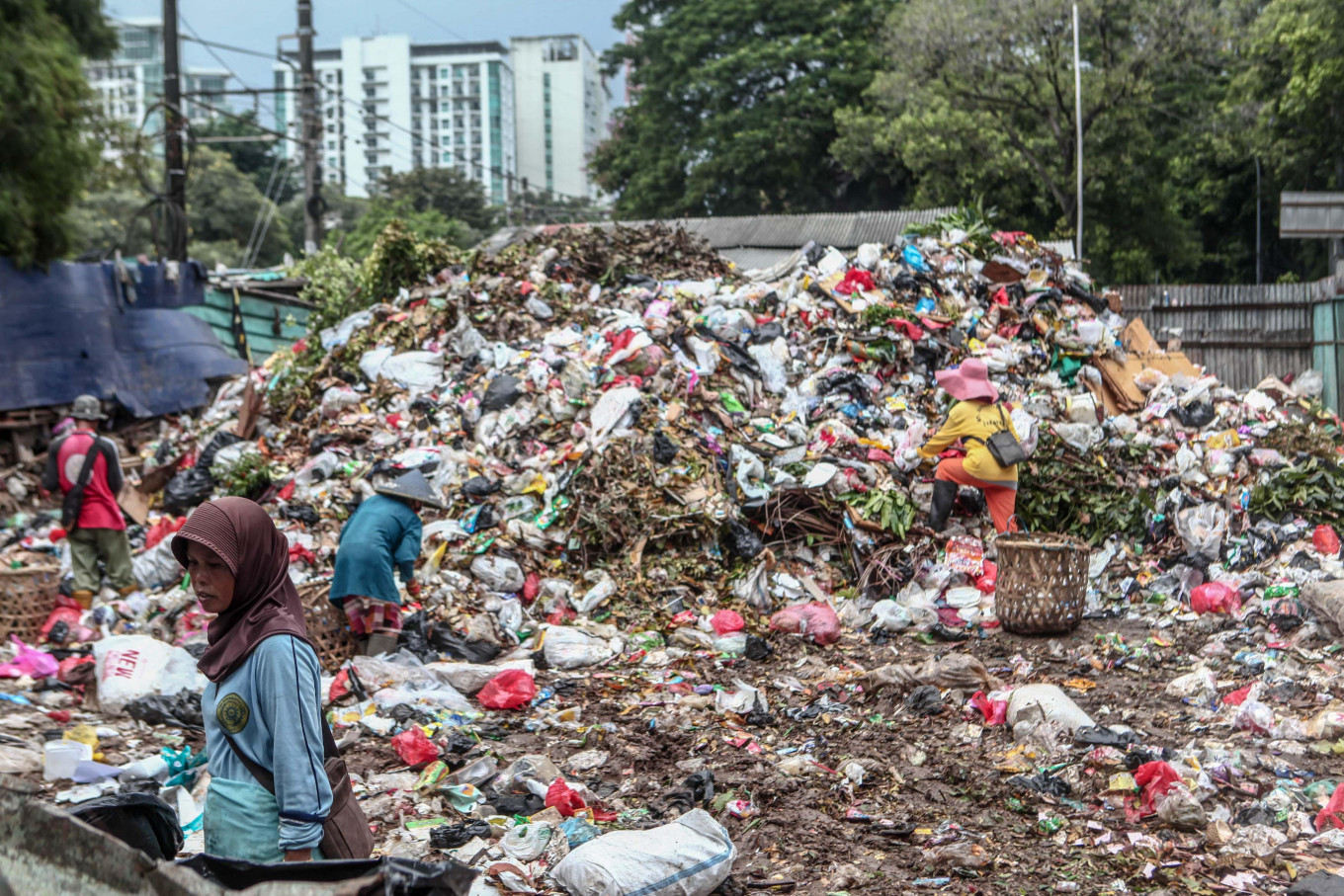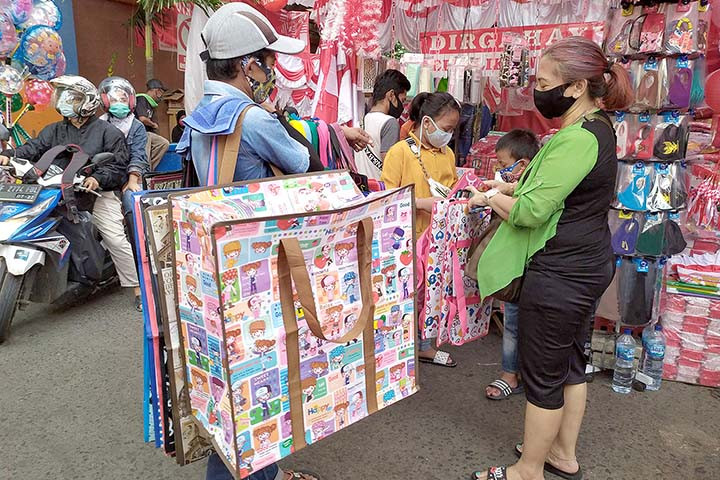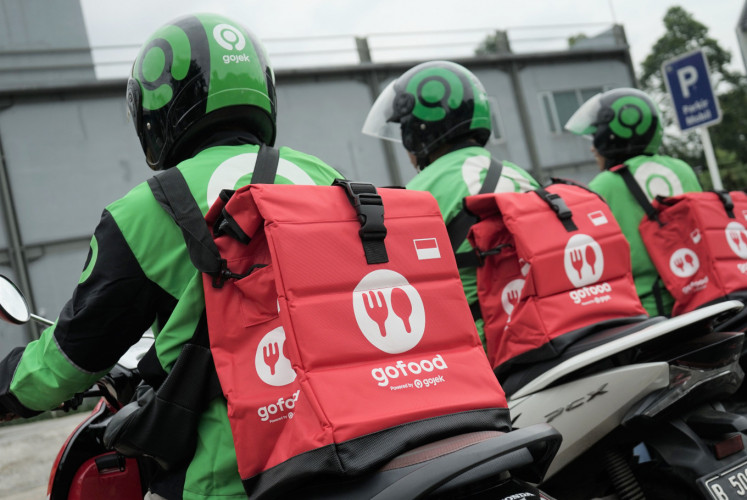Crucial role for online firms in plastic waste control
GoFood distributes over 22,600 reusable bags to driver-partners
Change text size
Gift Premium Articles
to Anyone

F
ood delivery and online shopping businesses in Jakarta are gearing up for more sustainable practices amid concerns that plastic waste might increase due to their buoyant services during COVID-19, despite the progress of the single-use plastic ban.
Seven months into the ban in Indonesia's capital, reports have shown a declining use of plastic bags in minimarkets. Indomaret, for example, has completely cut the monthly use of 8,000 single-use plastic bags per store, according to retail group Indomarco Prismatama managing director Wiwiek Yusuf. They have also seen decreased monthly sales of reusable tote bags, from 250 bags per store during the first month after the ban was in place to half the number now. This suggests that more buyers might be using the reusable bags they had bought earlier.
Indomaret’s data echoed a recent survey done by members of the Indonesian Plastic Bag Diet movement (GIDKP), which found that 90 percent out of 1,220 Jakartans had been bringing their own bags to the markets during the first six months of the ban.
Concerns remain, however, as the ban, which was effective beginning July last year after the pandemic hit, only regulates single-use plastic bags in traditional markets, modern supermarkets and minimarkets, excluding online businesses.
“The problem is that most online vendors are home businessowners. The ban has yet to address this despite a surge in online shopping during the pandemic,” GIDKP director Tiza Mafira told The Jakarta Post recently.
Read also: Jakarta begins new chapter in plastic waste reduction
Prior to the COVID-19 pandemic, the GIDKP had collaborated with online food delivery companies to develop the “less plastic” features on their delivery applications, where users can choose whether they want to purchase cutlery at checkout.
However, Tiza noticed that many vendors had ignored the system during the pandemic, while the companies’ attention had been divided on implementing contactless deliveries.
“There seems to be the misperception that everything now has to be single-use to be sanitary. In some restaurants, too, individually wrapped, disposable cutlery is used, even for dine-in,” she said.

E-commerce platforms also had a role in the sustainable practice by using the “less plastic” service for product packaging, following the best practices implemented abroad, Tiza said.
“We could have headed there in 2020 if the pandemic did not get in the way.”
This kind of feature to reduce the use of plastic materials is offered by homegrown on-demand multiservice company Gojek, through its food delivery service platform GoFood and the #GoGreener initiative. The company has distributed over 22,600 reusable bags among its GoFood driver-partners to avoid single-use plastic bags when delivering food from restaurants to customers.
Some 4,000 GoFood partnering merchants have joined the #GoGreener initiative since its launch in August 2019, saving as many as 13 tons of single-use disposable cutlery as of January, the company said.
Launched in 2015, GoFood has recorded 20-fold revenue growth in the last four years with a positive margin in 2020, despite the pandemic.

Gojek’s head of sustainability, Tanah Sullivan, said controlling the use of single-use plastics was one of the two main concerns to mitigate the environmental impact of Gojek’s operations, in addition to improving air quality.
“We are committed to mitigating the environmental impact of Gojek’s operations, as well as using our technology and platform to drive behavioral changes on a large scale,” Tanah told the Post on Friday.
She said the company also continued to encourage their culinary business partners to adopt greener business practices by providing them with reusable shopping bags to buy supplies and provided education about environmental awareness to both drivers and partnering merchants.
“Going forward, we will further strengthen our ecosystem through the #GoGreener strategies to avoid, reduce and process single-use plastic waste with and beyond recycling.”
Read also: Jakarta’s trash output down during COVID-19 but environmentalists warn of possible increase
E-commerce platform Shopee said it was committed to practicing a sustainable business while also providing a safe and comfortable shopping experience for all users.
“To support the single-use plastic ban in Jakarta, Shopee is urging its users to reuse plastic bags or cardboards from their Shopee product orders,” said Shopee Indonesia director Handhika Jahja.
“In addition, Shopee is also educating its sellers to use economical and efficient packaging while still paying attention to the safety of the goods until they reach the users.”
The company declined to elaborate on whether it had developed a program to specifically support those two objectives or whether it was aware of the estimated amount of plastic packaging materials used by its partners.
Read also: Skyscraper of waste: Greater Jakarta drowning in mountains of trash
The Jakarta Environment Agency said that out of 7,000 tons of daily waste in Jakarta, only 7 tons were plastic waste.
“The single-use plastic ban did not contribute much to waste reduction,” agency spokesperson Yogi Sarpras told the Post on Monday.
The administration, however, still lacks data on the amount of waste the plastic ban has been able to cut, relying on consumer perception data to evaluate the policy’s effectiveness.
In December last year, 30 percent of Jakartans said they were still being offered plastic bags in markets, a study by the Jakarta Environment Agency showed. Meanwhile, 42.95 percent of Jakartans said they shopped one to five times a month and 36.23 said they shopped over 20 times a month.
This echoed an earlier survey by the Indonesian Institute of Sciences (LIPI) that showed Greater Jakarta residents’ increased online shopping activities during quarantine, from one to five times a month to one to 10 times, with only half of residents sorting their waste for recycling.
“There is still no policy to ban the use of plastic bags for food deliveries and online companies, but we’re open to that after reviewing its public implications,” Yogi said.









